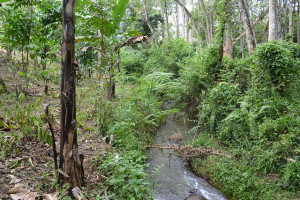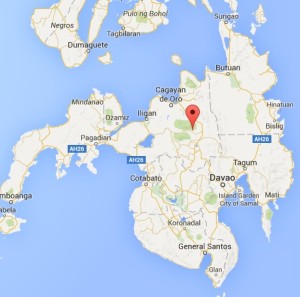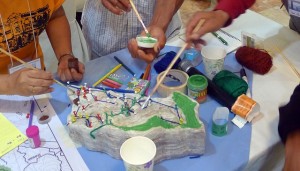Originally published at Agroforestry World Blog

Payment for Ecosystem Services (PES) is a known feature in the research and development worlds. Co-Investment, an instrument that aims at the same goal, still needs some explaining. Amy Cruz, Communication Officer for the World Agroforestry Centre (ICRAF) in the Philippines, went to a workshop in Lantapan, Philippines, to find out more about this initiative under the CGIAR Research Program on Forests, Trees and Agroforestry (FTA).
Most markets in the world don’t really trade in ‘watershed protection’ and ‘water provision’. However, a project in the municipality of Lantapan, southern Philippines wants to improve smallholders’ livelihoods and resilience in the face of climate change and market shocks through creating markets for watershed protection services, an idea also known as co-investment in watershed protection.
Co-investment schemes, which are very similar to payments for ecosystem services, may be seen as a cost-effective way of improving environmental management by rewarding communities for their efforts in providing ecosystem services. It is, in a way, communities ‘selling’ ecosystem services, such as watershed protection, to other communities or organizations that benefit from them.

In the case of the Lantapan sub-watersheds, farmers are involved as ‘sellers’ of watershed protection services in co-investment schemes developed as a part of the Climate-smart, Tree-based, Co-investment in Adaptation and Mitigation in Asia (Smart Tree-Invest) project. Implemented by the World Agroforestry Centre (ICRAF), Smart Tree-Invest is supported by the International Fund for Agricultural Development and the CGIAR FTA, with other sites in Indonesia and Viet Nam.
Researchers from ICRAF Philippines met with leading farmers and local government units of Lantapan to create a strategy for implementing a co-investment scheme in the municipality. They agreed to involve local people’s organizations as ‘sellers’. Representatives from the Association of Lantapan Sustainable Agroecological Zone, Tala-andig Tribal Organization and members of the Payments for Ecosystem Services Working Group would then be involved in developing business cases.
Preparing a business case

‘A business case is basically like a proposal. It includes profiles of the watershed and the sellers, the environmental services that could be offered, the list of activities for providing the services and the costing’, said Kharmina Evangelista, the project coordinator for Smart Tree-Invest Philippines.
During a training workshop in May 2016, farmers and members of the working group learned about the concept of PES and co-investment schemes and in the end successfully drafted their business case for the sub-watershed clusters in Lantapan.
Although the participants were very interested in the new concept, the workshop was not without challenges. The researchers found that the participants were not familiar with areas of the watershed and, thus, had some difficulty with three-dimensional mapping of the watershed. A follow-up workshop is needed for the participants from the Tala-andig Tribal Organization who were somewhat reserved in participating in the discussions. This will allow for the finalization of the costing of the business cases.
After all this is completed, and the business cases packaged, the participants will be able to present their offer to potential ‘buyers’ of the services and also to the Bukidnon Watershed Management Council.











